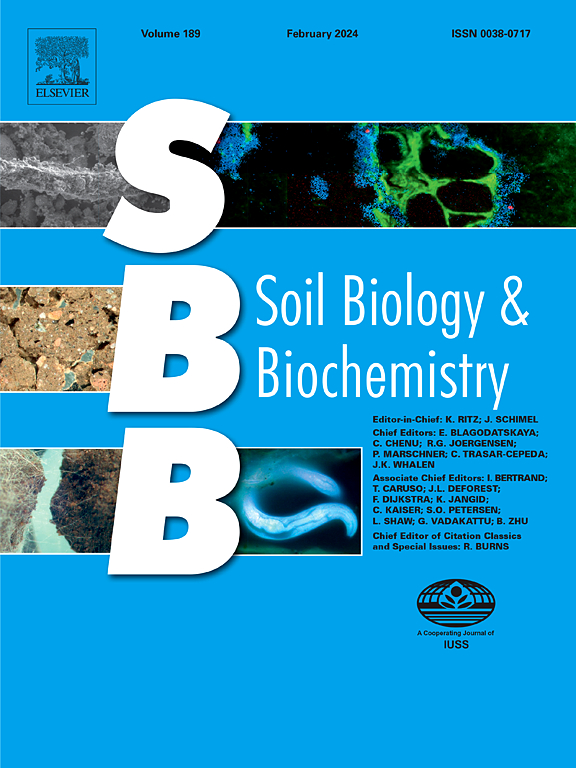Persistent macrodetritivore functional diversity and identity effects on litter mass loss under drought in a Mediterranean forest understory model ecosystem
IF 9.8
1区 农林科学
Q1 SOIL SCIENCE
引用次数: 0
Abstract
Soil macrofauna's role in plant litter decomposition is increasingly recognized, with litterbag experiments in natural and lab settings highlighting its contribution in various pedoclimatic context. Recent findings indicate that macrofauna can counteract drought-induced slowing of decomposition and nutrient cycling, but the underlying mechanisms remain unclear. Characteristics of macrofauna communities, such as functional diversity (FD), community-weighted mean (CWM) traits, and species identity, may drive these effects and modulate decomposition responses to drought. In a controlled experiment simulating a Mediterranean forest understory, we tested how different macrodetritivore assemblages with increasing FD, based on five decomposition-related traits, affect decomposition under drought. We hypothesized that both FD and CWM of consumption rate would increase litter mass loss, with stronger effects under drought. Irrespective of species composition, results showed that higher FD significantly promoted litter mass loss, while consumption rate CWM had a small additional effect, supporting complementarity among species over the mass-ratio hypothesis. Species identity explained more variance than FD and CWM combined, highlighting the influence of specific species in the assemblages. Although drought reduced overall litter mass loss, the positive relationship between FD and mass loss persisted, suggesting that diverse macrodetritivore communities continue to promote decomposition and nutrient cycling under drought. This suggests that more functionally diverse macrodetritivore communities continue to promote litter decomposition and, consequently, nutrient cycling, even during periods of drought. These findings emphasize the importance of macrodetritivore communities in litter decomposition across climatic conditions and highlight the need to consider species identity in future biodiversity-ecosystem function studies.

干旱条件下地中海森林林下模式生态系统中持久性大腐殖物功能多样性和同一性对凋落物质量损失的影响
土壤大型动物在植物凋落物分解中的作用越来越被认识到,在自然和实验室环境下进行的垃圾袋实验突出了其在各种土壤气候背景下的贡献。最近的研究结果表明,大型动物可以抵消干旱导致的分解和养分循环的减缓,但潜在的机制尚不清楚。大型动物群落的功能多样性(FD)、群落加权平均(CWM)特征和物种特征等特征可能驱动这些效应,并调节对干旱的分解响应。在模拟地中海森林林下植被的对照试验中,我们基于5个与分解相关的性状,测试了随着FD的增加,不同大腐物组合对干旱条件下分解的影响。我们假设FD和CWM消耗速率都会增加凋落物质量损失,且在干旱条件下影响更大。结果表明,无论物种组成如何,较高的FD显著促进了凋落物质量损失,而消耗率CWM对凋落物质量损失的影响较小,支持物种间的互补性,而不是质量比假说。与FD和CWM的组合相比,物种身份解释了更多的变异,突出了特定物种在组合中的影响。尽管干旱降低了凋落物总质量损失,但FD与质量损失之间的正相关关系持续存在,这表明干旱条件下,不同的大型腐生物群落继续促进凋落物的分解和养分循环。这表明,即使在干旱时期,功能更多样化的大型腐殖动物群落继续促进凋落物分解,从而促进养分循环。这些发现强调了大型腐殖物群落在各种气候条件下凋落物分解中的重要性,并强调了在未来的生物多样性-生态系统功能研究中考虑物种身份的必要性。
本文章由计算机程序翻译,如有差异,请以英文原文为准。
求助全文
约1分钟内获得全文
求助全文
来源期刊

Soil Biology & Biochemistry
农林科学-土壤科学
CiteScore
16.90
自引率
9.30%
发文量
312
审稿时长
49 days
期刊介绍:
Soil Biology & Biochemistry publishes original research articles of international significance focusing on biological processes in soil and their applications to soil and environmental quality. Major topics include the ecology and biochemical processes of soil organisms, their effects on the environment, and interactions with plants. The journal also welcomes state-of-the-art reviews and discussions on contemporary research in soil biology and biochemistry.
 求助内容:
求助内容: 应助结果提醒方式:
应助结果提醒方式:


